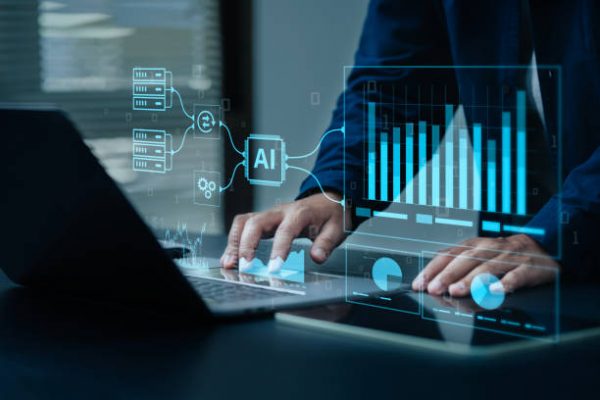
- April 26 2025
- SFI Solution Team
The Role of AI-Generated Code in the Future of API Integrations
In the contemporary digital landscape, effective API integration has become crucial for organizations seeking to streamline operations, improve customer interactions, and foster innovation. As APIs remain the vital link between various systems, the strategies for constructing, overseeing, and enhancing these integrations are advancing swiftly. One of the most significant breakthroughs is AI-generated code, which has the potential to revolutionize the future of API integrations. This blog will examine the impact of AI-generated code on API development, the advantages and obstacles it presents, and the steps businesses need to take to remain competitive in a progressively AI-centric environment.
What is AI-Generated Code?
AI-generated code refers to software code written or assisted by artificial intelligence models. These AI systems, trained on vast libraries of programming languages and frameworks, can automatically generate, suggest, or optimize code based on high-level inputs or design parameters. From simple scripts to complex API connectors, AI-generated code is increasingly reducing the time and effort developers traditionally invest in integration tasks.
Popular platforms like GitHub Copilot, OpenAI Codex, and other AI-powered IDEs have demonstrated the potential of machine learning models to co-author robust, efficient, and scalable code.
How AI is Transforming API Integrations
Accelerating Development Speed
Traditional API integrations often require weeks of planning, coding, and testing. With AI-generated code, developers can dramatically reduce this timeline. AI tools can instantly generate boilerplate code, manage authentication flows, handle error responses, and even create documentation—allowing teams to focus on customization and strategic work.
Reducing Human Error
Manual coding inevitably leads to mistakes, which can cause integration failures or security vulnerabilities. AI tools, when trained on best practices, significantly minimize human error. They can automatically enforce coding standards, suggest security improvements, and highlight potential integration issues before they escalate.
Enhancing Scalability
Businesses today must manage increasingly complex API ecosystems. AI-generated code helps organizations scale their API integrations effortlessly by automating repetitive tasks and enabling faster onboarding of new APIs. Whether it’s integrating a new CRM system or syncing data across cloud platforms, AI drastically improves scalability.
Facilitating Cross-Platform Compatibility
Integrating APIs across different technologies, platforms, and languages can be challenging. AI models trained on multiple tech stacks can generate code snippets that are compatible across environments, reducing friction and enabling seamless cross-platform integrations.
Benefits of AI-Generated Code in API Integrations
Increased Productivity
Developers can focus more on strategic architecture rather than writing repetitive code.
Faster Time to Market
AI accelerates the API development and integration cycles, helping businesses innovate quicker.
Cost Efficiency
Automating integration tasks reduces the need for extensive manual labor and lowers development costs.
Continuous Improvement
AI models learn and improve over time, leading to better, more optimized code with each project.
Enhanced Security
AI tools can incorporate security best practices automatically, reducing vulnerabilities in integrations.
Challenges and Considerations
While AI-generated code holds immense promise, it is not without its challenges.
Quality Assurance : Not all AI-generated code is production-ready. It still requires human oversight, rigorous testing, and validation.
Security Risks : AI models can inadvertently generate insecure code if not properly trained or monitored.
Intellectual Property Issues : Questions about the ownership of AI-generated code continue to spark debate.
Dependence on Training Data : The effectiveness of AI is limited by the quality and breadth of its training datasets.
Thus, businesses must implement strong review processes, employ security testing, and stay informed about evolving legal frameworks around AI-generated assets.
Future Outlook : AI as a Co-Developer for API Integrations
Looking forward, the role of AI in API integrations is likely to grow from being a helpful assistant to becoming a trusted co-developer.
Fully Autonomous Integrations
AI systems will be capable of handling entire integration projects with minimal human intervention.
Proactive Error Handling
Future AI tools will not just code but also predict integration failures and auto-correct them in real-time.
Smarter API Discovery
AI will assist businesses in discovering, evaluating, and selecting APIs that best meet their operational needs.
Customized Integration Workflows
AI will tailor integration architectures based on a business’s specific objectives and operational constraints.
Organizations that invest in AI-powered integration strategies today will be better positioned to lead tomorrow’s digital economy.
Best Practices for Leveraging AI-Generated Code in API Integrations
If you’re ready to embrace AI-driven API development, keep these best practices in mind :
Maintain Human Oversight
Always review AI-generated code for logic, security, and compliance.
Invest in AI Training
Use models trained on high-quality, secure, and modern codebases.
Focus on Security
Incorporate security testing and auditing in every phase of integration development.
Stay Agile
Build flexible integration architectures that can adapt as AI capabilities evolve.
Educate Your Team
Train your developers to work effectively with AI tools and understand their limitations.
Conclusion
AI-generated code is not just a futuristic concept—it’s reshaping how businesses approach API integrations today. By accelerating development, reducing costs, and improving security, AI is becoming a critical enabler of digital transformation. However, to fully harness its potential, organizations must adopt a strategic, security-first approach and maintain human oversight.
As the role of AI continues to grow, those who embrace these advancements will gain a significant competitive edge, delivering faster, smarter, and more secure integrations in an increasingly connected world.
Ready to future-proof your API integrations?
Contact us to learn how we can help you leverage AI-driven solutions for your business success.
Previous Post